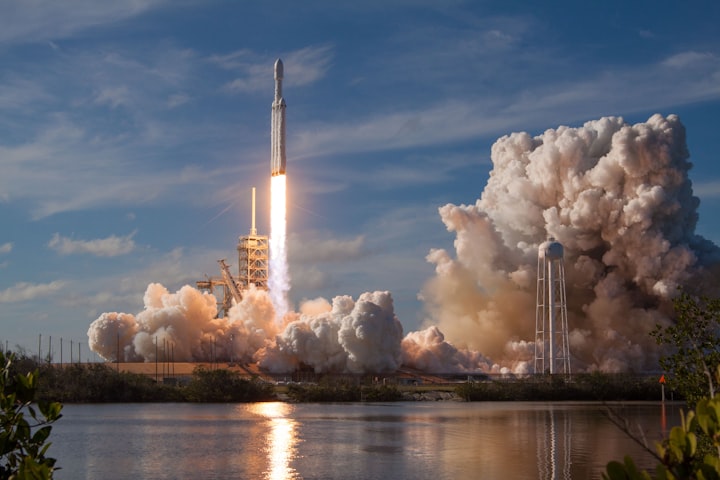Space Tourism
Journeying into the final Frontier
Titleceourismurneyingntoheina
Introduction:
Space, once the exclusive domain of astronauts and scientists, is now opening up to a new kind of explorer – space tourists. With the rise of private space companies like SpaceX and Blue Origin, the dream of venturing beyond Earth's atmosphere is becoming a reality for those with the means and the desire to embark on an extraordinary adventure. This article explores the emerging field of space tourism, highlighting the challenges, opportunities, and the transformative potential of commercial space travel.
1. The Pioneers of Space Tourism:
SpaceX, founded by visionary entrepreneur Elon Musk, and Blue Origin, led by Amazon founder Jeff Bezos, are at the forefront of revolutionizing space exploration and making space tourism a tangible goal. These companies are spearheading the development of reusable rockets, spacecraft, and infrastructure to enable affordable and routine access to space for civilians. Through their ambitious plans and achievements, they are paving the way for a new era of space travel.
SpaceX has successfully launched crewed missions to the International Space Station (ISS) using its Crew Dragon spacecraft, while Blue Origin's New Shepard has completed multiple suborbital test flights. These milestones demonstrate the companies' progress towards making space tourism a reality.
2. The Space Tourism Experience:
A journey as a space tourist begins with thorough pre-flight preparations, including medical assessments, training on safety procedures, and familiarization with the spacecraft. Once onboard the spacecraft, space tourists will experience the awe-inspiring sensation of weightlessness as they venture into space.
The activities available to space tourists vary depending on the duration and purpose of the mission. They may include Earth observation, space experiments, and even spacewalks, providing a unique perspective of our planet and the universe beyond. The experience promises to be both exhilarating and humbling as tourists gaze upon the vastness of space.
Accompanying the space tourists will be trained spaceflight professionals who will guide them throughout the journey, ensuring their safety and enriching their experience with their expertise and knowledge.
3. Technological Advancements and Safety:
Space tourism companies are investing heavily in technological advancements to ensure the safety and reliability of their missions. Advanced rocket designs, such as SpaceX's Falcon rockets and Blue Origin's New Shepard, prioritize reusability, significantly reducing launch costs and increasing operational efficiency.
Life support systems are crucial for sustaining human life in the inhospitable environment of space. Companies are engineering robust life support systems to provide a safe and comfortable experience for space tourists, with features such as temperature and atmospheric control, waste management, and emergency contingencies.
To ensure the safety of space tourists, rigorous training programs are being developed. These programs include simulations of launch and landing procedures, emergency response drills, and physical training to prepare individuals for the physical demands of space travel. The training aims to equip space tourists with the knowledge and skills necessary to handle the unique challenges of being in space.
4. The Economics of Space Tourism:
Space tourism represents not only a transformative experience but also a burgeoning industry with economic implications. The cost of a space tourism ticket is currently high, often reaching millions of dollars, reflecting the nascent nature of the market and the significant investments required in infrastructure and technology.
However, as space tourism evolves and becomes more accessible, it has the potential to drive down costs through economies of scale and technological advancements. Lower costs would enable a broader demographic to engage in space tourism, fueling demand and opening new revenue streams for space tourism companies.
Beyond the direct impact on the space tourism industry, there are broader economic benefits. Space tourism can stimulate related industries such as hospitality, entertainment, and manufacturing, creating jobs and boosting local economies. Furthermore, advancements in space technologies driven by the demands of space tourism have the potential to yield spin-off innovations with applications in various sectors, further contributing to economic growth.
5. Environmental Considerations:
While space tourism offers incredible possibilities, it is not without environmental consequences. Rocket launches contribute to carbon emissions and produce atmospheric pollutants. As the frequency of launches increases with the growth of space tourism, these environmental impacts become more significant.
To mitigate these effects, space tourism companies are exploring sustainable practices. Research and development efforts focus on developing greener propellants and propulsion systems, reducing the carbon footprint of rocket launches. Additionally, companies are working to enhance recycling and waste management systems to minimize space debris and ensure responsible environmental stewardship.
Collaboration between space tourism companies, regulatory bodies, and environmental organizations is vital to strike a balance between the wonders of space exploration and the preservation of our planet.
6. The Future of Space Tourism:
The vision for space tourism extends far beyond suborbital joyrides. Companies are actively exploring the potential for orbital hotels, where tourists could experience extended stays in space, providing opportunities for in-depth scientific research, space-based manufacturing, and the development of a commercial space ecosystem.
Lunar tourism, with missions to the Moon, and eventually, the colonization of Mars, are also part of the long-term aspirations of space tourism companies. These ambitious endeavors will require further advancements in technology, infrastructure, and life support systems.
Space tourism has the power to inspire future generations, fuel scientific discovery, and advance our understanding of the cosmos. As technology continues to advance and costs decrease, space tourism holds the potential to become an increasingly accessible and transformative experience.
7. Ethical and Legal Challenges:
The rise of space tourism brings ethical considerations and regulatory challenges. As humans venture into space, questions arise regarding the fair distribution of resources between space exploration and pressing terrestrial issues, such as poverty, healthcare, and climate change.
The legal framework governing space tourism is evolving. International agreements, such as the Outer Space Treaty, provide a foundation for regulating space activities, including space tourism. However, specific regulations and guidelines tailored to space tourism are still being developed to address issues of safety, liability, and responsible conduct.
Ethical debates surrounding space tourism range from the ethical treatment of space tourists to the long-term impact on celestial bodies and extraterrestrial environments. Ensuring that space tourism adheres to high ethical standards and promotes sustainability is essential for the long-term viability and acceptance of the industry.
Conclusion:
Space tourism represents a significant leap forward in humanity's quest to explore the cosmos. It offers a transformative experience, pushing the boundaries of what is possible and inspiring a sense of awe and wonder. While challenges and ethical considerations persist, space tourism has the potential to reshape our understanding of our place in the universe and ignite a new era of exploration and discovery.
As more companies enter the space tourism market and technology advances further, the final frontier may become an accessible destination for a growing number of intrepid space travelers, ushering in a new chapter in human space exploration. Balancing economic considerations, safety protocols, environmental sustainability, and ethical responsibilities will be crucial in shaping the future of space tourism, ensuring its positive impact on individuals, society, and the continued exploration and preservation of space.






Comments
There are no comments for this story
Be the first to respond and start the conversation.